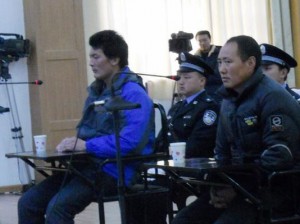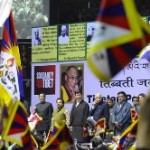
Flags are raised in the Talkatora Stadium, New Delhi. Former deputy PM LK Advani and Sikyong Dr Lobsang Sangay
The Tibetan Central Administration and the Tibetan Parliament in exile organised one of the largest gathering of Tibetans and Indian supporters in the Indian capital for the Tibetan Solidarity Movement. More than 5,000 Tibetans converged in Delhi from India, Nepal and Bhutan, as well as over 1,500 Indian supporters, to partake in the four day campaign from 30 January to 2 February.་་The objective of the campaign was to express solidarity with Tibetans inside Tibet, to highlight the tragic situation prevailing there, to draw the attention of the international community to the sacrifices of Tibetans there, and to seek international support.
Alongside the event, ministers and members of Tibetan Parliament in Exile met with senior officers of the India-based United Nations Human Rights Council, and foreign diplomats from 20 countries. The delegation requested the representatives to urge China to:
- allow unfettered access to Tibet for the media, the United Nations and International fact-finding delegations to investigate and report on the real causes behind the self-immolations;
- allow governmental, parliamentary and diplomatic delegations to visit Tibet in order to ascertain ground realities in Tibet; and
- review its failed hardline policies in Tibet and address the genuine grievances of the Tibetan people by resolving the issue of Tibet through dialogue.
The four-day campaign began on a political high note with top Indian leaders from both sides of the Indian Parliament expressing their support and solidarity with Tibet. Former deputy prime minister and stalwart Indian leader LK Advani shared the stage with official representatives of the ruling Indian National Congress and members of parliament, Priya Dutt and Dr EM Sudarsan Natchiappan.
In his introductory remarks, Speaker of the Tibetan Parliament, Penpa Tsering noted that Tibetans had gathered to express solidarity with Tibetans inside Tibet, where he said the situation is getting “more and more grave each day. Just making a statement is not enough. World leaders should tell the Chinese government that Tibet issue needs to be resolved for the interest of China” he said.་་LK Advani pledged to remind the Indian public of their responsibility towards the Tibetan people.
The second day began with interfaith prayers. Religious leaders’ representatives from Buddhist, Christain, Islam, Jain, Hindu, Sikh, Bahai and Jewish faiths led the prayer meeting which was attended by over 7000 people. H.E. Kirti Rinpoche, the religious head of Kirti Monasteries where more than 30 self-immolations had taken place, took part, along with over 700 Tibetan Buddhist monks.་་Prayers were followed by a march. Participants carried placards and raised slogans urging India and the international community to “take urgent diplomatic action to end the crisis inside Tibet”. The march was from Samtha Sthal to Jantar Mantar, where there was a daylong sit-in with speakers from various religious faiths.
The third day was a day of prayer, led by His Eminence Gaden Tri Rinpoche, 102nd Throne-holder of the Gelugpa tradition of Tibetan Buddhism and the first of Indian origin. Over 6000 Tibetans took part in the public event, the majority of them from monastic communities.་་The campaign concluded on the final day with a strong show of support for the Tibetan struggle from Indian leaders from across party lines. Prominent Indian leaders including former union ministers, representatives of major political parties, and youth leaders flocked to Jantar Mantar to express their solidarity with the ongoing crisis inside Tibet, and over 30 Indian leaders – members of parliament, party leaders, and youth leaders addressed the gathering. Also joining the mass sit-in were at least a thousand Indian supporters carrying photos of Tibetan self-immolators and placards calling for greater political support for Tibet from their government.
The Tibetan Prime Minister (Kalon Tripa) in exile Lobsang Sangay called for a stronger endorsement of non-violent methods by the international community, saying “if non-violence is the right thing to do, we ought to be supported by the international community”.




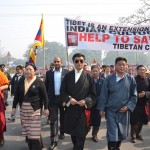
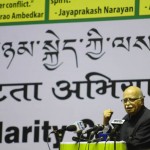
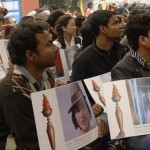
 Print
Print Email
Email